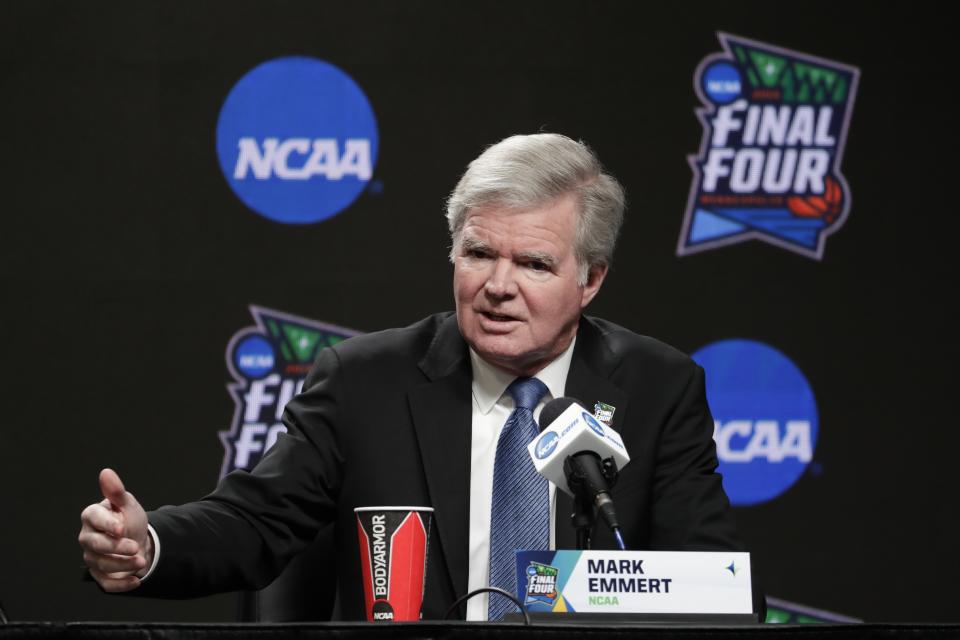Top NCAA officials, including president Mark Emmert, taking pay cuts amid coronavirus pandemic
Top NCAA administrators, including president Mark Emmert, will take pay cuts as the governing body deals with the effects of the coronavirus pandemic.
According to USA Today, NCAA senior management, including Emmert, will take 20 percent pay cuts while NCAA vice presidents will see their pay cut by 10 percent.
Yahoo Sports reported last year that Emmert made $3.9 million in the 2018 fiscal year, $1.4 million of which came from a deferred payment that was written into his contract. Per USA Today, Emmert made just over $2.1 million in base salary in 2017. Donald Remy, then the NCAA’s executive vice president and now its chief operating officer, had the next most-lucrative salary at “just under $1.1 million.”
The temporary salary reductions come on the heels of a significant decrease in revenue distribution for the NCAA. The NCAA initially projected it would distribute $600 million among its Division I membership, but that figure plummeted to $225 million after the cancellation of all spring championships and remaining winter championships, most notably the men’s basketball tournament. A significant chunk of NCAA earnings come from March Madness.
[Coronavirus: How the sports world is responding to the pandemic]
When announcing the cuts in revenue distribution, the NCAA also acknowledged a “variety of cost-cutting budget measures” would begin in the coming weeks. Emmert, in a memo distributed to membership on Tuesday, acknowledged the “financial challenges” ahead for universities across the country.

Emmert said cutting into the salaries of top NCAA administrators serves as a way to “free up needed resources” while highlighting his administration’s “commitment to weather the current economic challenges.”
Here is a portion of Emmert’s memo, via USA Today:
"As you know, last week the NCAA Board of Governors announced a significant reduction in the amount of money distributed to member schools and conferences. Many of you are facing significant financial challenges and difficult choices. Likewise, the national office is looking at every function to garner savings that could be used to support student-athletes in this uncertain economic time.
"To that end, as a first step I have decided to reduce my salary and that of our nine other highest compensated leaders by 20% and the rest of my President’s Cabinet by 10%. This temporary reduction will free up needed resources and highlights our commitment to weather the current economic challenges we face while continuing to provide opportunities to college athletes."
More financial challenges on the way
There are plenty more financial challenges ahead for athletic departments.
On Monday, the NCAA announced that it would restore a year of eligibility for spring-sport athletes who lost their 2020 season due to the coronavirus. Last week, USA Today estimated it could cost public schools in Power Five conferences in the range of $500,000 to $900,000 to fulfill those scholarships.
In its Monday announcement, the NCAA said schools will have the ability to adjust the amount of financial aid provided to athletes who “would have exhausted their eligibility in 2019-20” for the extra year of eligibility. That, plus the ability to dip into the NCAA’s Student Assistance Fund, could offset some of the costs of the additional scholarship years.
The more ominous financial hit could come if the upcoming football season is compromised or, worse yet, not played. Brett McMurphy of Stadium polled FBS athletic directors across the country, many of whom believe there is at least a 50-percent chance a full FBS football season will not be played in 2020 because of the lasting impacts of the coronavirus.
One AD told McMurphy that “many programs will be out of business” if there is no football season while others fear it could mean having to cut non-revenue sports at their school.
Football is a massive source of revenue for the NCAA via media rights, ticket sales and other avenues. Most programs around the country would be in the midst of spring practice this time of year, but the coronavirus outbreak put a halt to all team activities.
More from Yahoo Sports:

